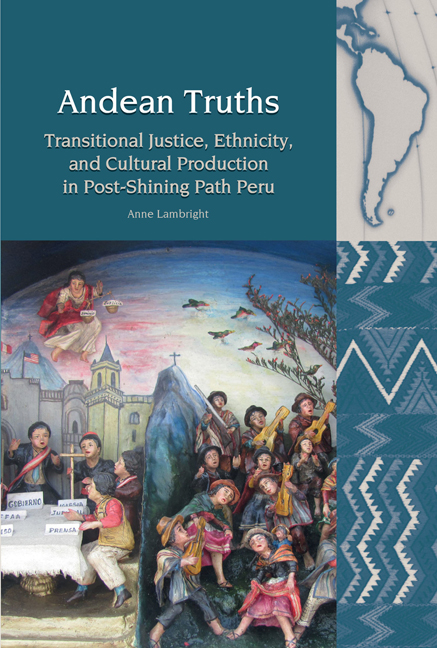Book contents
- Frontmatter
- Contents
- List of Figures
- Acknowledgements
- Introduction
- 1 Sustaining Dominant Narratives
- 2 Transitional Justice and Reconciliation through Identification
- 3 Dead Body Politics
- 4 Towards a Narrative Pachacutic
- 5 Collaborative Truth-Telling
- 6 Reconciling through other Knowledges
- 7 Conclusion
- Works Cited
- Index
1 - Sustaining Dominant Narratives
- Frontmatter
- Contents
- List of Figures
- Acknowledgements
- Introduction
- 1 Sustaining Dominant Narratives
- 2 Transitional Justice and Reconciliation through Identification
- 3 Dead Body Politics
- 4 Towards a Narrative Pachacutic
- 5 Collaborative Truth-Telling
- 6 Reconciling through other Knowledges
- 7 Conclusion
- Works Cited
- Index
Summary
La hora azul, Abril rojo, and Un lugar llamado Oreja de Perro
La hora azul, Abril rojo, Un lugar llamado Oreja de Perro CHNAGE THIS
Among the most celebrated post-CVR literary publications are three Spanish-language novels by Alonso Cueto (La hora azul, 2005; The Blue Hour, 2012), Santiago Roncagliolo (Abril rojo, 2006; Red April, 2009), and Iván Thays [Un lugar llamado Oreja de Perro (A Place Called Oreja de Perro), 2008]. Written by limeño male writers of international stature, published by multinational firms for international audiences, these works of fiction explore many themes that occupied the CVR: memory and forgetting, the search for truth, the insufficiency of language for articulating that truth, and the level of guilt and responsibility that should be borne by those not directly involved in the conflict. Read in conjunction with transitional justice processes and with the Informe final, the novels also help interrogate the role of the dominant classes in truth-gathering, interpreting information gathered, integrating victimized populations, and articulating a post-conflict future for the nation. Nevertheless, despite containing important reflections on these issues and critiques of transitional justice processes in Peru, these works rely too acritically on historically reiterated tropes of indigeneity, ultimately adding to the symbolic violence suffered by native cultures and reaffirming their marginality to the national project.
There were certainly works of fiction written in the midst of the conflict, before the Truth Commission. Mark R. Cox, in an introduction to his anthology of fiction written during the conflict, counts over one hundred short stories and thirty novels published between 1986 and 2000. I am interested in these three narratives, however, because they were published after the 2003 release of the Informe final, and thus become a lens through which we can read the activities and report of the CVR, by teasing out and focusing on certain themes that are present in the Informe. I will argue that, even as they attempt to analyze critically the conflict and post-conflict eras, the novels, like most official transitional justice processes in Peru, ultimately return to the status quo. Unable to shake the confines of a discourse comfortably familiar to their intended audiences, La hora azul, Abril rojo, and Un lugar llamado Oreja de Perro sustain and reaffirm the notion of two Perus, whose purportedly irreconcilable differences continue to justify the marginalization of Andean (and Amazonian) cultures and peoples within the national imaginary.
- Type
- Chapter
- Information
- Andean TruthsTransitional Justice, Ethnicity, and Cultural Production in Post-Shining Path Peru, pp. 30 - 59Publisher: Liverpool University PressPrint publication year: 2015



